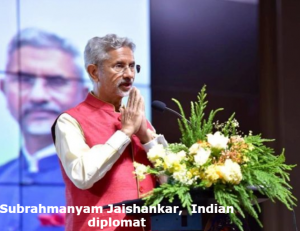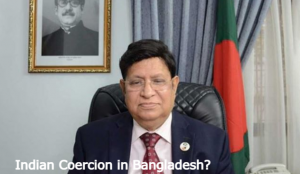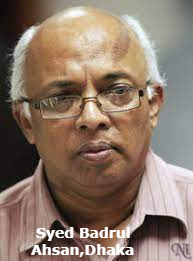South Asian Regional Politics
N. P. Upadhyaya (Aryal)
 Kathmandu: On August 17, 2022, the Indian foreign minister S. Jaishankar almost “appealed” India’s rival China to shun the bilateral differences in the larger interest of giving a formal shape to what he called ‘Asian Century’ for which, he says, cordial ties in between the two rival nations, India and China, must exist.
Kathmandu: On August 17, 2022, the Indian foreign minister S. Jaishankar almost “appealed” India’s rival China to shun the bilateral differences in the larger interest of giving a formal shape to what he called ‘Asian Century’ for which, he says, cordial ties in between the two rival nations, India and China, must exist.
The split personality that Shankar is , as he is being taken in Nepal for himself being an Indian, having a Japanese wife and an American son, made such an appealing observation while making a lecture on ‘India’s Vision of the Indo-Pacific’ at the prestigious Chulalongkorn University, Thailand.
Though the notion of Asian Century was first coined by Imperial Japan in the 1940s but the concept got aborted after Japan got defeated in the second World War.
Japan thus have had to shelve the idea for good.
Later the same theory was taken up by Pundit Nehru of India which too could not take a shape and thus vanished in the ethereal medium with the passage of time.
In the recent years the same concept was thought about by Chinese President Xi Jinping.
According to China, India and Japan do not have the right to talk of Asian century as both have now become a strong component of Quad ( Australia, Japan, the US and India).
Asia is and should be for Asians, so says China.
China, takes the partnership of Japan and India in the US led Quad as “Asian NATO”.
With these commentaries in place yet the Indian foreign minister, “The Asian Century would not happen if the two neighbours do not join hands”.
Having said that, the Indian minister also admitted that the two countries, China and India, were currently going through an “extremely difficult phase”.
In an implied manner the Indian minister accepted that they both have tense relations due to the recurring skirmishes in the borders of late or say in the recent years.
During the lecture in Thailand, Shankar however, hinted that if China and India want to come closer then they have abundant good reasons to do so.
If it happens then Nepal has no reasons to get afraid either of China or India.
Nepal fears that if and when India and China come face to face, then will be told to side with India which would be “pretty difficult” for Nepal to any China and Vice versa.
Yet the “Mera Bharat Mahan” personalities would definitely take the side of India for multiple reasons as India for them is the incarnation of the Almighty in the form of a nation born 1947.
This obviously leads us to conclude that these tilted personalities take China as Demon in the neighborhood.
Observers in Nepal, through their own “ terrible and horrifying” experience with next door enemy India would wish to suggest China, though it is also not a reliable and trusted friend of Nepal, not to get lured by this split personality’s soothing lecture made in Thailand.
China is not a trusted friend of Nepal got testified when Nepal was hit by a mega quake in April 2015, the same year on May, China and India signed a bilateral agreement to do business through Lipulek ( a Nepali landmass) which, the blunder that it is, yet to be corrected by China.
This way, China is definitely not a friend that could be relied upon by Nepal.
Hopefully, the Thai students at the university may have taken “elevated” FM Shankar as a knowledgeable and modest Indian diplomat; however, Nepal knows well and experienced Mr.
Shankar’s coercive, hegemonic and expansionist attitude towards the smaller neighbors of India who have been repenting on why on earth their neighbor India is?
Shankar is out and out a negative man, as far as Nepal’s experience is about him.
This negative man had come to Nepal in the year 2015 to press Nepal to halt the promulgation of the new Constitution so that “Indian choices and preferences” could be inserted in the upcoming constitution.
It was an outright coercive dictates from the lanky Indian foreign minister that in a candid manner substantiated the assumption that India runs Nepal using several arm twisting tricks.
How much India is coercive and destructive or has kept its smaller neighbors in a terrified state gets testified when the sitting foreign minister of Bangladesh, Dr. A K Momen who has just “appealed to the Indian authorities to do everything to ensure that Sheikh Hasina’s government, here in Bangladesh, remains in office” after the elections that are due this year end. 
This means “Delhi will shape B’desh politics but not the Bangladeshis -the people of Bangladesh?
This in itself is a great puzzle. Though Nepal is accustomed to such puzzles after the 1990s political change that was in itself designed, funded and executed by Indian machination through the tacit support of domestic “Mera Bharat Mahan” leaders.
This Bangladeshi even also exposes Indian intentions of splitting Pakistan into two halves and taking control over the emerging satellite Bangladesh?
To recall, Bang Bandhu Mujibur Rehman, with due respect, was out and out the Indian choice to which even “nationalists Bangladeshis admit belatedly.
Needless to say, realizing the Indian tricks for the emergence of a new country in South Asia, the people now, religion wise, prefer Pakistan over India.

Writes our colleague Syed Badrul Ahsan for Dhaka Tribune dated August 20, 2022, that “ the foreign minister’s comments throw up a disturbing set of circumstances. In the first place, they inform the world that Bangladesh’s diplomatic establishment is incapable of formulating and carrying out the country’s foreign policy objectives. In the second, they let the world know, to our intense shame that the political party now in power in Dhaka will remain in office on the strength of Indian support for it. Our votes do not and will not matter”.
Our professional colleagues in Dhaka suspects the very credentials of the minister and by extension PM Hasina as well.
They even infer that the minister may have “tacit” ties with the RAW-India’s spy agency.
Broadly speaking, India perhaps has recruited some “men” in the Dhaka cabinet for understandable reasons as suspected by a scholar Zainal Abedin. (We will come to Abedin later).
In Nepal, observers are confident that B’desh is a country made for serving India by splitting Pakistan.
And today’s Nepal is also serving India in a manner as desired by India.
Reminds of traitor Lendhup Dorje of Sikkim….
It may not be true but by default it is becoming more than a bitter truth.
The split though weakened Pakistan to some/greater extent.
Thus the minister Momen, as media reports say that he is the Indian choice for Sheikh Hasina’s Cabinet.
It may be rumor only to malign his political credentials.
Let’s presume then “several” ministers of India’s choice and preference are in Hasina’s cabinet and this way, B’desh apparently is run by South Block as intended as back as in the early seventies by Mrs. Gandhi who broke Pakistan.
A Twitterati from Bangladesh, Nznn Ahmed( a Muslim woman interested in geopolitics) has it: “How can the foreign minister of an independent –sovereign country say such things who, Minister Momen, had “requested India to ensure PM Hasina’s government at any cost”.
Or in other words, she says, “Requested India to do whatever it takes to sustain Sheikh Hasina’s government”.
B’deshi nationals now have abundant explanations at their perusal as to why the senile lady of India Madame Gandhi bifurcated Pakistan?
Clearly, she wanted a satellite state that obeyed her sermons and dictates.
In the meanwhile, when the Bangladeshi media and intellectuals excessively grilled FM Momen, he on August 22, corrected his version.
All that Momen said was that, “he had talked to the Indian government about stability in Bangladesh in the light of the ongoing global instability”.
“Requested the Indian government to help the PM maintain stability of her government”, Momen clarified after braving much criticism.
But yet question is: how an India which itself is in an unstable and disturbed situation could provide solace to the Bangla government?
Nepali observers say that it is India itself which brings in disturbances to regional stability and then enters into the trouble ridden country in the name of “mediation” opines a Pakistani political analyst Dr.
Manzoor Naazer, in one of his articles published in this news portal some time back.
And this mediation efforts of India benefits India and India only. So in all likelihood, the present disturbances in B’desh could be the handi-work of Indian establishment itself to extract political benefits.
Thus Foreign Minister Momen’s clarification is more that fishy.
Enters Zaianal Abedin: 
This B’deshi scholar while attending an International webinar held in Islamabad in June 2020, appealed his participating scholars from a host of Muslim countries to form what he called a “coalition” of sort in order to fight and dispel the Indian Spy agency RAW-menace which, Abedin guarantees, has been eating Bangladeshi government and the country’s politics like a moth and that the RAW peril was so rampant in his country that making and breaking of governments were a common phenomenon.
Zainal’s statement perhaps adds to our strength when we take India as the nearest and dearest “enemy” that it is for sure.
He says, most of the ministers in the upper rung of the government structure were all close to “RAW”.
Tentatively, Nepal too is plagued with the RAW hazard perhaps more than Bangladesh to the extent that Nepal is soon to become an Indian protectorate if and when the Citizenship bill awaiting final approval from the President takes to authority of a Law.
Notably, the RAW Chief S. K. Goyal has direct access to the bed room of Nepal’s Prime Minister.
What does this mean? Draw your own conclusions.
Thus, in a way, Bangladesh and Nepal are competing voluntarily (?) to serve the “mad elephant” in the South Asian room which has so far damaged more or less the entire smaller South Asian nations.
Classic examples are obviously Nepal and Bangladesh. Pakistan has its own horrifying experience with India since the next days of the grand partition. That’s all.
Nepal and Bangladesh are close neighbors and the initiators of the SAARC regional body.
Nepal wishes all the best for Bangladesh and its friendly people. That’s all.
# Our own contact email address is: editor.telegraphnepal@gmail.com
